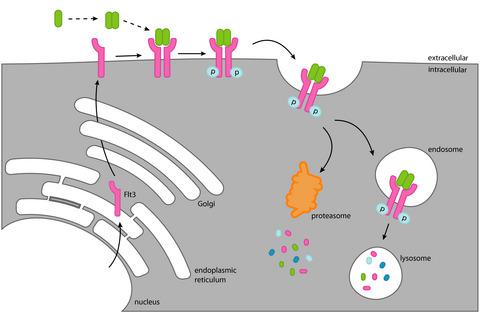当前位置:
X-MOL 学术
›
Immunol. Cell Biol.
›
论文详情
Our official English website, www.x-mol.net, welcomes your
feedback! (Note: you will need to create a separate account there.)
Dendritic cell Flt3 – regulation, roles and repercussions for immunotherapy
Immunology and Cell Biology ( IF 3.2 ) Pub Date : 2021-06-07 , DOI: 10.1111/imcb.12484 Kayla R Wilson 1 , Jose A Villadangos 1, 2 , Justine D Mintern 1
Immunology and Cell Biology ( IF 3.2 ) Pub Date : 2021-06-07 , DOI: 10.1111/imcb.12484 Kayla R Wilson 1 , Jose A Villadangos 1, 2 , Justine D Mintern 1
Affiliation

|
Dendritic cells (DCs) are essential for initiating immune responses. Depending on the environment, the type of DC and the way in which they interact with T cells, these immune responses can be beneficial or detrimental. DCs can be exploited as cellular vectors for vaccines against infection and cancer. The development and maintenance of DCs is dependent on the FMS-like tyrosine kinase 3 (Flt3)/Flt3 ligand (Flt3L) signaling cascade. Flt3 is also one of the most commonly mutated genes in acute myeloid leukemia and as such represents an attractive drug target. In this review, Flt3 is discussed with a particular focus on DCs. We detail the lifecycle of Flt3, from transcription to degradation, and interrogate recent studies as to how this pathway can be manipulated for immunotherapy, vaccination and treatment of autoimmune disease.
中文翻译:

树突状细胞 Flt3——免疫疗法的调节、作用和影响
树突状细胞 (DC) 对于启动免疫反应至关重要。根据环境、DC 的类型以及它们与 T 细胞相互作用的方式,这些免疫反应可能是有益的,也可能是有害的。DCs 可用作细胞载体,用于抗感染和抗癌疫苗。DC 的发育和维持取决于 FMS 样酪氨酸激酶 3 (Flt3)/Flt3 配体 (Flt3L) 信号级联。Flt3 也是急性髓系白血病中最常见的突变基因之一,因此代表了一个有吸引力的药物靶点。在这篇评论中,Flt3 的讨论重点是 DC。我们详细介绍了 Flt3 的生命周期,从转录到降解,并询问最近的研究,了解如何操纵该途径进行免疫疗法、疫苗接种和自身免疫性疾病的治疗。
更新日期:2021-06-07
中文翻译:

树突状细胞 Flt3——免疫疗法的调节、作用和影响
树突状细胞 (DC) 对于启动免疫反应至关重要。根据环境、DC 的类型以及它们与 T 细胞相互作用的方式,这些免疫反应可能是有益的,也可能是有害的。DCs 可用作细胞载体,用于抗感染和抗癌疫苗。DC 的发育和维持取决于 FMS 样酪氨酸激酶 3 (Flt3)/Flt3 配体 (Flt3L) 信号级联。Flt3 也是急性髓系白血病中最常见的突变基因之一,因此代表了一个有吸引力的药物靶点。在这篇评论中,Flt3 的讨论重点是 DC。我们详细介绍了 Flt3 的生命周期,从转录到降解,并询问最近的研究,了解如何操纵该途径进行免疫疗法、疫苗接种和自身免疫性疾病的治疗。











































 京公网安备 11010802027423号
京公网安备 11010802027423号